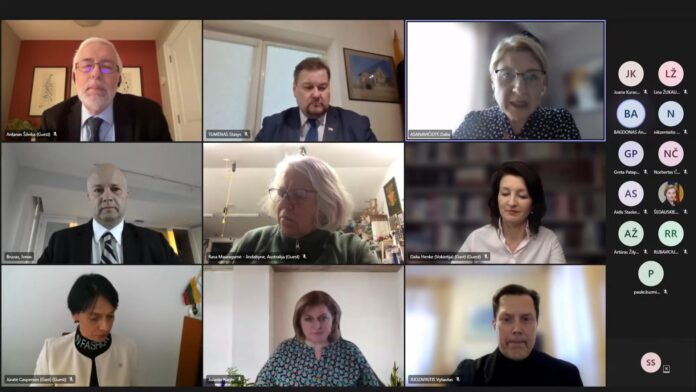
At the semi-annual meeting of the Lithuanian Parliamentary and World Lithuanian Community Commission on December 10, discussions about historical memory and Lithuania’s image in the world resulted in a resolution on this topic, presented by Lithuanian-Canadian author Antanas Šileika. He reviewed information reflected in the world press, television, social media and other outlets about Lithuania and its image, and some of the problematic issues Lithuanians in the diaspora face because of the impressions still held by non-Lithuanians.
Commssion chairs Dalia Asanavičiūtė (LT MP) and lawyer Jonas Bružas of Chicago emphasized the importance of this topic for Lithuanians throughout the world, because many of them are volunteer ambassadors for Lithuania.
Paulė Kuzmickienė, chair of the Parliamentary Commission on Freedom Fighting and Historical Memory presented the history of the Lithuanian resistance, deportations and emigration, a history that was suppressed during the Soviet regime. Another member of that commission, Dr. Stasys Tumėnas, spoke about the righteous (teisuoliai), Lithuanians who strove to improve the country’s image after the Holocaust.He also suggested a day of commemoration to remember their efforts.
Another speaker, head of the Lithuanian government’s image management group Marius Gurskas reported on the group’s work in promoting Lithuania and attracting investors and tourists. Dr. Norbertas Černiauskas, professor of history at Vilnius University, gave an outline of the history curriculum in Lithuanian schools and the status of the history of the diaspora in the school programs.
History Institute Director Dr. Alvydas Nikžentaitis reported on various historical interpretations of Lithuania’s past discussed at a conference held in June of this year. Communication and Cultural Diplomacy Department Director at the Ministry of Foreign Affairs Marius Janukonis spoke about the Ministry’s efforts to improve Lithuania’s image in the world.
The director of the the Lithuanian Genocide and Resistance Research Centre Dr. Arūnas Bubnys presented the Centre’s work on publications in foreign languages, published to inform the non-Lithuanian public about “the war after the war”, that is, the post-war partisan resistance and the aftermath of Soviet-Stalinist genocide.
The Commission agreed to return to these topics in future meetings and to participate in public discussions, so important in the process of creating the country’s image and highlighting its unique features.
News from alkas.lt





























